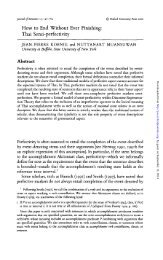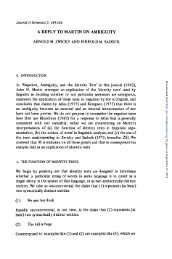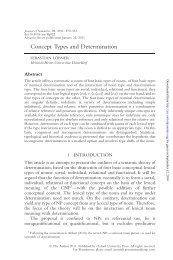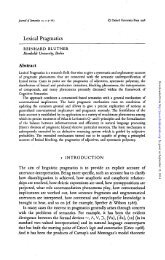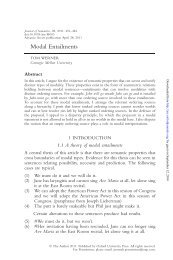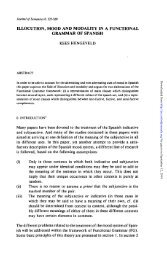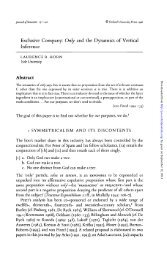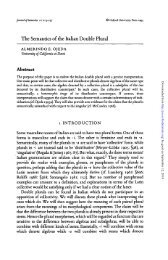Aspectual Coercion and Logical Polysemy - Journal of Semantics
Aspectual Coercion and Logical Polysemy - Journal of Semantics
Aspectual Coercion and Logical Polysemy - Journal of Semantics
You also want an ePaper? Increase the reach of your titles
YUMPU automatically turns print PDFs into web optimized ePapers that Google loves.
158 <strong>Aspectual</strong> <strong>Coercion</strong> <strong>and</strong> <strong>Logical</strong> <strong>Polysemy</strong><br />
polymorphic in well-defined ways allow us to overcome the explanatory<br />
inadequacies inherent in word sense enumeration approaches to lexical semantics.<br />
Although some <strong>of</strong> the details <strong>of</strong> the analysis have been omitted in order to<br />
concentrate on the general strategy <strong>of</strong> lexical analysis employed here, we have<br />
hopefully made clearer what some <strong>of</strong> the specific theoretical advantages <strong>of</strong> this<br />
approach are.<br />
Acknowledgements<br />
We would like to thank Peter Bosch, Bob Ingria, Noam Chomsky, Federica Busa, Michael<br />
Johnston, Evelyne Viegas, Graham Russell, <strong>and</strong> two anonymous reviewers for their helpful<br />
comments <strong>and</strong> suggestions. All responsibility for errors are <strong>of</strong> course our own.<br />
JAMES PUSTEJOVSKY<br />
Computer Science Department<br />
Br<strong>and</strong>eis University<br />
Waltham, MA 02254<br />
USA<br />
e-mail.jamesp@cs.br<strong>and</strong>eis.edu<br />
PIERRETTE BOUILLON<br />
ISSCO<br />
University <strong>of</strong> Geneva<br />
54 route des Acacias<br />
Ch-1227 Geneva<br />
Switzerl<strong>and</strong><br />
e-mail:pb@ divsun. unige.ch<br />
NOTES<br />
See, for example, the work reported in<br />
Buitelaar & Mineur (1994), which<br />
attempts to unify some <strong>of</strong> the notions<br />
from Generative Lexicon Theory with<br />
Categorial Grammar. Busa & Dini (1994)<br />
attempt to import the notions <strong>of</strong> coercion<br />
with qualia structure (see below) into<br />
HPSG for the h<strong>and</strong>ling <strong>of</strong> control<br />
phenomena, while Bouillon & Viegas<br />
(1994) h<strong>and</strong>le cross-linguistic phenomena<br />
<strong>of</strong> adjective-noun collocations.<br />
Both Copestake (1993) <strong>and</strong> Sanfilippo<br />
(1990) are also interesting in how they<br />
model the projection <strong>of</strong> lexical semantic<br />
information to the syntax.<br />
Received: 18.07.94<br />
Revised version received: 05.12.94<br />
2 Qualia structure can be seen as providing<br />
the 'modes <strong>of</strong> explanation* for a concept,<br />
as lexicalized in a particular word.<br />
3 This is not strictly true, as we shall see in<br />
Section 5 below, where we introduce the<br />
notion <strong>of</strong> an eventual function.<br />
4 As one reviewer points out, we experience<br />
objects in any number <strong>of</strong> ways. That is,<br />
one need not read books in order to be<br />
bored by them. One can be bored by<br />
looking at them, shopping for them,<br />
writing them, or thinking about them.<br />
This is not in any way inconsistent with<br />
the GL approach. As discussed in Pustejovsky<br />
(1991a) <strong>and</strong> elaborated on in<br />
Downloaded from http://jos.oxfordjournals.org/ by guest on September 12, 2014



